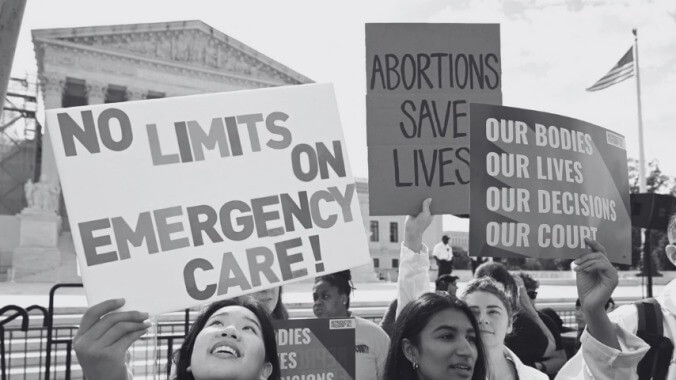Kentucky GOP Wants to Write Emergency Abortions Out of Existence
A new bill invokes the idea of "maternal-fetal separation," an anti-abortion term that could lead to doctors performing a c-section or labor induction instead of a much safer, less complicated abortion.
Photo: Getty Images AbortionPolitics
Anti-abortion politicians know their position is unpopular, so they’re constantly getting more creative and wielding increasingly misleading talking points to push their forced birth agenda. Kentucky’s HB 90, which just passed the legislature and now heads to Gov. Andy Beshear’s (D) desk, is a perfect example of this.
HB 90 eases requirements imposed on birthing centers in the state, which could help more of these centers open. That, on its face, is perfectly fine. But at the eleventh hour, anti-abortion lawmakers squeezed in an unrelated amendment claiming to “clarify” when health care workers can provide emergency abortions: “There is a desperate need for clarity on a lot of … medical issues that come up during the course of a pregnancy,” state Sen. Julie Raque Adams (R) said when she brought the bill before the Senate last week. “There is a lot of misinformation out there in the medical community, and doctors just need to be doctors. And so this language that’s before us today adds some much needed clarity for the medical community.”
To be clear, Adams is an anti-abortion extremist: Her voting record includes votes for numerous abortion bans and restrictions. If she wanted to help the medical community, or pregnant patients for that matter, she’d repeal those laws—instead, despite its misleading language, her bill is meant to sow further confusion and impose even more limits on when doctors can provide emergency abortions.
Medical experts and advocates say the amendment attached to HB 90 places pregnant patients at greater risk while failing to “clarify” anything. “It adds nothing” helpful, Tamarra Wieder, Kentucky state director for Planned Parenthood Alliance Advocates, told Jezebel.
-

-

-

-

-

-

-

-

-

-

-

-

-

-

-

-

-

-

-

-

-

-

-

-

-

-

-

-

-

-

-

-

-

-

-

-

-

-

-

-








































